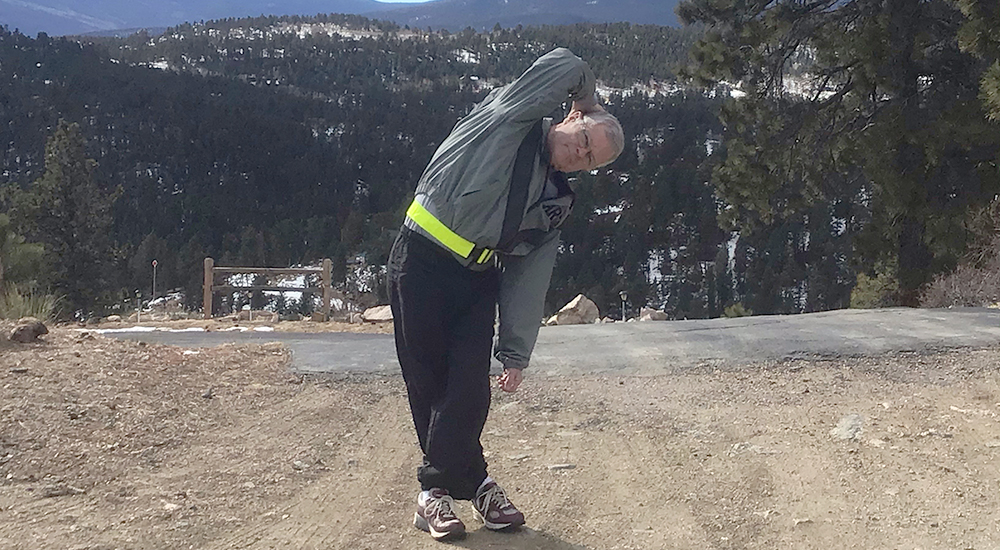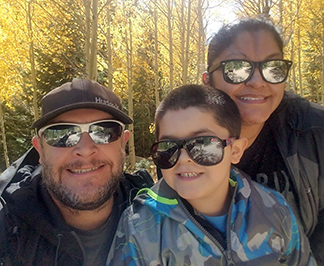When Army Veteran Tim Peterson joined the VA Airborne Hazards and Open Burn Pit Registry, he thought he was a healthy guy. At 60 years old, he ran a 5K and did 80 push-ups and sit-ups three days a week.
“I give myself a standard Army PT test once a year (pictured above) and I could pass at any age category,” he said. “I felt great, I never got sick, I was sharp as a tack.”
So, when the environmental health team from the VA Eastern Colorado Health Care System called him in 2019 to see if he would like to take advantage of the free, optional health evaluation that’s a part of the registry, he initially thought “why should I go?”
But in the end, he did get the exam – and it probably saved his life.
Navy Veteran Yanderyn Shoup has a similar story. When her local Veteran Service Officer sent her information about the VA Gulf War Registry in 2019, “I clicked to see if I would qualify, and I did, because it was open to anyone who was on a ship in the Persian Gulf. I didn’t have any symptoms, but I figured it couldn’t hurt,” Shoup said.
Not your average doctor’s appointment
Both registry evaluations were performed by Dr. Anisa Moore, an environmental health clinician at the VA clinic in Golden, CO. As a part of VA’s post-deployment health programs, Moore regularly examines Veterans who join both the airborne hazards and Gulf War registries.
“For Veterans who may have been exposed to a variety of environmental hazards during their deployments, VA registry exams can be the mechanism that gets them connected to treatment for any diagnosis,” Moore said. “We diagnose anything we find, regardless of whether it could have been caused by their military exposures.”
Like her colleagues across the VA health care system, Moore’s registry evaluations are more in-depth than a regular doctor’s appointment. She considers these visits her “one bite at the apple” to do a comprehensive physical examination. She asks in-depth questions that aren’t always covered during regular primary care visits and orders a variety of diagnostic tests.
All free of charge to registry participants
“I was very impressed with Dr. Moore, just the questions she asked,” Peterson said of his exam. “And then she said, ‘Let’s run you over for an x-ray just to make sure your lungs are fine.’ And they were, but there was something at the top of my abdomen. I was so lucky they caught it.”
What his scans showed was a large tumor on his pancreas. “What you don’t realize is that most people don’t know until it’s too late,” Peterson added. “By the time I would have felt anything, it would have been too late.” Almost a year and a half later, after additional tests determined his type of pancreatic cancer could be controlled by monthly chemo injections, his tumors have shrunk, and he is doing well.
“Something else will probably get me before pancreatic cancer does because I’m doing so well,” he said. Now, he’s back to working out as much as he did before the diagnosis.
Found early, thyroid cancer is treatable
The same is true for Shoup, whose thyroid cancer was first detected by Moore during her exam.
“It wasn’t easily noticeable, but we do focus a lot on the head and neck,” Moore said. “When she told me she was 37, but she felt 87, that raised my antennae. Her thyroid function was normal but it felt a little funky.”
Moore sent her for a diagnostic ultrasound, just to be sure.
“I was able to get surgery within two months of diagnosis,” Shoup said of her thyroidectomy, performed by VA, which showed she had stage three cancer. “And because it was early, it was really treatable.
“Now I just see my doctor every three months and, if after this year I’m clear, I don’t have to come back for two years.”
Both Veterans pleased to be helping other Veterans
“I’m fairly savvy, I’m older. I can fight these battles for myself,” said Peterson, of why he joined the Airborne Hazards and Open Burn Pit Registry. “But there were 18 other people there who helped me run an airfield. Documenting these things can help those younger Veterans get the help they need.”
Moore said the exams don’t just benefit the Veterans they currently are seeing.
“The exams also help other Veterans in the future, through research,” Moore shared. “You can’t collect the research and understand the potential longer-term health impacts of military environmental exposures until you do a good job diagnosing those conditions in the first place.
“For Veterans, it’s an opportunity to help themselves. Even if they are completely healthy and feeling fine, it can be a baseline in case they have other issues later in life. But they aren’t just helping themselves They are helping their fellow Veterans too.”
Asked what joining the registry means to her, Shoup said, “I’m a mom and a wife and a friend and a sister. It’s just my whole life. I’m going to join the airborne hazards registry, too. Anything I can do that will help other people like me.”
To learn more about joining the Airborne Hazards and Open Burn Pit Registry, visit www.publichealth.VA.gov/airbornehazards. If you have already completed the online questionnaire, you can contact your local environmental health coordinator to schedule your registry evaluation at your convenience.
Elizabeth Meyer provides contract support for VA’s Post Deployment Health Services.
Topics in this story
More Stories
The Medical Foster Home program offers Veterans an alternative to nursing homes.
Watch the Under Secretary for Health and a panel of experts discuss VA Health Connect tele-emergency care.
The 2024 National Veteran Suicide Prevention Annual Report provides the foundation for VA’s suicide prevention programs and initiatives.








Does the VA do asbestos screening?
Most of the pre-1980 DoD buildings (dorms, housing, shops, schools, and …) contain friable asbestos?
Does the VA do Airborne Hazards screening for service members that were injured stateside?
Virtually every military base in the United States used unlined open-air burn pits and incinerators (without an air scrubber to remove toxic chemicals).